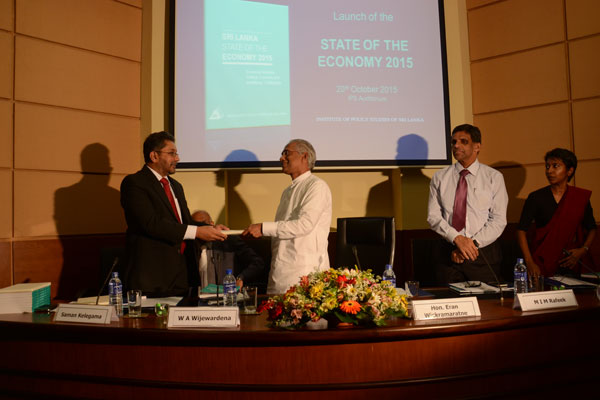
Sri Lanka needs to reform taxation, loss making state enterprises, labour market, agriculture and social protection to ensure long term economic growth, observed the Institute of Policy Studies (IPS) releasing its flagship report Sri Lanka State of The Economy 2015.
The report spells out a range of economic challenges the new government is facing of which fiscal consolidation is key. Deputy Minister of State Enterprise Development, Eran Wickramaratne addressing the gathering said the government’s immediate focus will be the stability of foreign reserves while introducing necessary economic reforms.
“In the past the economy was driven by largely a public investment programme and borrowings. So, the new government has to work hard to improve the enabling environment so that we attract investments,” Minister Wickramaratne said.
Finance Minister Ravi Karunanayake told a business forum on Monday that the budget deficit for 2015 could increase to 6.8 percent, up from an original estimate of 4.4 percent of GDP. Currently expenditure stands at well over 110 percent of GDP and it’s primarily made up of salaries and wages, interest payment on public debt, transfers and subsidies, the report said.
“What needs to be done is to address Sri Lanka’s weak revenue generation and rationalize our expenditure such as public sector wages, pensions, state enterprises, subsidies, transfers as well as debt management,” Dr. Dushni Weerakoon, Deputy Director of IPS said.
“We would be happy if the budget focuses entirely on the revenue side and not on ad hoc one-off tax measures but signaling serious intentions to begin a systematic revenue generation agenda” Weerakoon said.
In 2014, the state-owned Ceylon Electricity Board (CEB) incurred operating losses of 11.7 billion rupees, Ceylon Petroleum Corporation (CPC) 1.7 billion and Sri Lankan airlines 29 billion rupees.
“The burden of state enterprises on the treasury and the tax payer needs to be brought down. The tax payer at large is paying for the expenses of a few who are benefiting directly from those enterprises,” minister Wickramaratne said.
“We are also looking at reducing political intervention so that managers of these institutions can pursue their economic and financial goals,”IPS says agriculture is another sector that needs major reforms to enhance productivity and efficiency. To modernize agriculture and industry, Sri Lanka needs to infuse new technology and skilled labour.
The report says sixty percent of the island’s labour force is in the informal sector with no proper social protection or access to training.
“For sustained long term growth it is not the numbers that enter the labor market that matter but labour productivity. Therefore, we need reforms to increase flexibility and productivity of the labor force,” Weerakoon said.
“What we are arguing in The State of The Economy 2015 report is that there is sufficient policy space for the government to take a pragmatic approach to weigh options and decides what is feasible,” she said.

0 comments